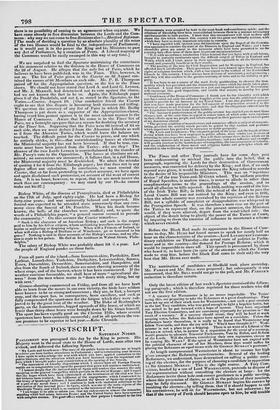The Times and other Tory journals have for some days
pt.sst been endeavouring to mislead the public into the belief, that a paragraph, reproving the Lords for their destruction of Government measures, was concocted for delivery by the King; arid that, if no such reproof were given, it would be only because the King refused to accede to the desire of his responsible Ministers. This was an "ingenious device" of the true Tono-and-M‘Guee school. The uniform practice of Royal Speeches, in modern times, is never to allude in other than complimentary terms to the proceedings of the session, and to avoid all allusion to bills rejected. In 1834, nothing was said of the loss of the Irish Tithe Bill ; in 1833, the refusal of the Lords to pass the Local Courts Bill was not noticed by the King; and even in 1831, when the whole country was convulsed by the rejection of the Reform Bill, not a syllable of complaint or disapprobation was whispered in the Prorogation Speech. It was therefore a mere ruse on the part of the Tories to represent that, on the present occasion, the Ministers would, if they were allowed, depart from the estabIshed rule : the object of the deceit being to glorify the power of the Tories at Court, by imputing to them the exercise of influence to counteract a scheme which never existed.


























 Previous page
Previous page